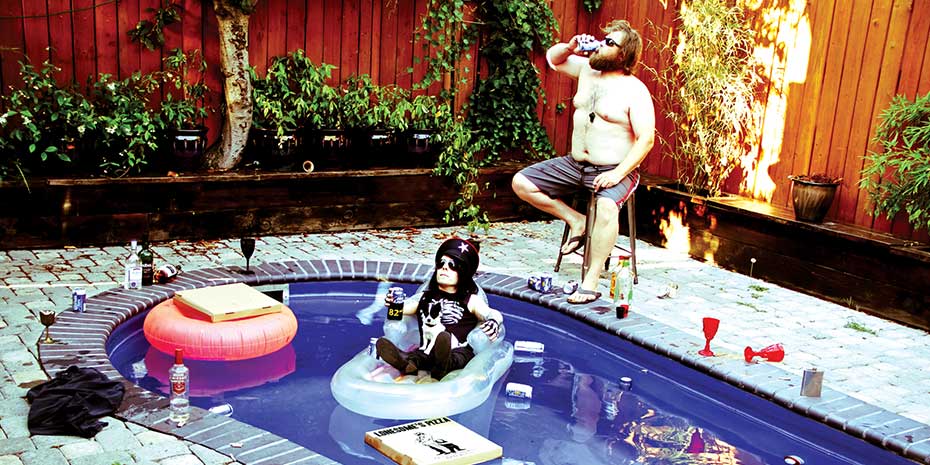Nik Sin of Lonesome’s Pizza


“A hero,” Nik Sin says, “is anybody that anybody can look up to and has trekked new ground people have not crossed.” He sits casually in the patio chair outside his kitchen’s sliding glass door. There is a small in-ground pool in the background where his small Chihuahua patters around sticking its nose in the afternoon’s debris. It is probably an easy eighty-five degrees. Nik clads himself in heavy black leather boots, thick black denim jeans with black tee to match, and aviators paired with a dress cap that was probably swiped off a USSR military officer. He looks at the full sleeve of tattoos on his arms and acknowledges words like “hero” have been tossed around near his name, but expresses reservations about it. Still, he manages to cite things like how in high school he played football, was on the wrestling team, and did theater—despite the notions of many doubters of the three foot adolescent’s ability. He smiles and laughs, admitting that he does think it’s pretty cool.
Some heroes are made, forged by monumental experiences. For Nik, he was born. Never setting out to be “more iconic than yesterday,” or out to “prove people wrong.” He was born a little person whose everyday life wove him together into the water-tight character he is today. He says, “You can’t not be who you are born as,” a secret to success foreshadowed: “I meet a lot of people with disabilities, and you have to overcome them either way.”
Being three feet tall is a double-edged sword of advantage and disadvantage. He chuckles at memories of hanging out with his friends in the mall as a kid, kicking a garbage can over and having mall cops confront other passer-byers, perhaps motivated by their social cowardice of approaching someone different than them. But being different also means having eyes on you all the time.
“I have always had that spotlight,” he says, “even before I knew there was a spotlight.” As an entertainer and entrepreneur (Nik co-owns Lonesome’s Pizza), the spotlight is certainly a plus. But sometimes he just wants to go to the grocery store without someone trying to help him get the caesar dressing off the middle shelf. “It can be beneficial, like in the entertainment world where it is a gimmick, but there is also everyday life. There is driving, grocery shopping, and signing your name at the DMV counter that’s three inches above your head; it is also living in a world that is not made for me.” That said, he wouldn’t give the spotlight up because it has made him who he is today. The spotlight of being a person with a disability is the catalyst—the courage—that motivates him to be the person he wants to be, and so people can know that they can have a disability and be themselves. That they don’t have to be the cookie-cutter other people want them to be.
“When I was growing up I didn’t have anyone to look up to,” he says, and we reminisce about the days prior to the internet. “I didn’t know any other little people. I didn’t interact with people like me until I was 16 or 17.” The internet has changed things and shaped his endgame; he wants to have some six year old kid who has a similar story as him to be able to see him online and see that, “Holy shit, there is a midget with tattoos and eyeliner and a bunch of beer and a huge social media following,” instead of the oompa loompa and leprechaun bullshit he grew up with. The next step is empowerment.
The key to empowerment is controlling it. “It is, you know, people use the words midget and dwarf in a negative light. But you know when you embrace those words, you take someone’s weapons away from them—which are the only weapons they have are to call you a midget or dwarf or whatever they might call you. You should be like ‘oh yeah, I will out-drink you anyways.’ That is the key to empowerment. It is not letting a person’s words hurt you. A lot of the times it is that someone doesn’t know another little person or midget or dwarf. Not that there is a difference.” He pauses the interview to make sure the next thing is on the record. “There is no difference. There is no difference, there is only how you take it.” That is your empowerment. »
– Billy Dye



